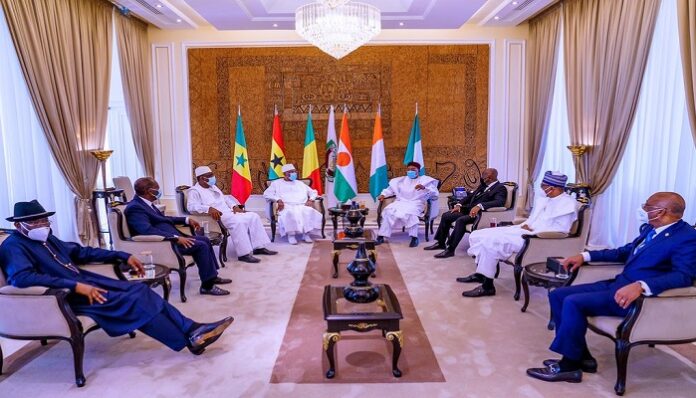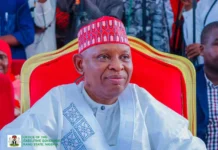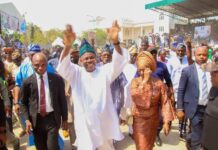
Economic Community of West African States (ECOWAS) Special Envoy to Mali and former Nigerian president, Goodluck Jonathan, would today meet military ‘coup’ leaders in Bamako, capital of Mali, in company of West African leaders, with the aim of finding lasting solution to the crisis in the country.
AFP reports that Jonathan alongside 14 other leaders in the regional bloc would be in Bamako on Saturday for peace talks with the military ‘coup’ leaders, including Assimi Goita who has declared himself head of the new administration in Mali.
Reacting to the request for a meeting with the leaders, an official of the military leaders told AFP that they were ready to receive the West African leaders.
READ ALSO:
Buhari Constitutes UNILAG Visitation Panel, Suspends Babalakin, Ogundipe
“We will receive the ECOWAS delegation with pleasure…it is important to talk to our brothers,” he stated.
It would be recalled that Mali’s elected president, Ibrahim Keita, was on Tuesday overthrown by mutinying troops, who took him and Prime Minister Boubou Cisse and other senior officials into custody.
The coup sent shockwaves around West Africa, sparking fears that one of the region’s most volatile states, and a front line in the fight against jihadism, could collapse.
Keita, who later appeared in a state television broadcast on Wednesday, declared the dissolution of the government and National Assembly and said he had no choice but to resign with immediate effect.
He announced his resignation and dissolved parliament, saying his decision to quit became necessary to avoid bloodshed.
The world and regional leaders condemned in strong terms the coup in Mali.
The military ‘coup’ leaders, however, remained adamant, with Goita, a Colonel in the Malian Army, declaring himself head of the “National Committee for the Salvation of the People,” a group created by the rebels.
Goita, a graduate of the US training for international forces, is one of the five soldiers who pronounced the formation of the salvation committee and later announced his new position after a meeting with top civil servants.
Mali’s last coup in 2012 followed almost exact pattern with Captain Amadou Sanogo having attended a six-month training mission with the US before the coup.
But, in a swift reaction, the US said on Friday it had suspended cooperation with Mali’s military in response to the overthrow of the president.
“Let me say categorically there is no further training or support of Malian armed forces full-stop. We have halted everything until such time as we can clarify the situation,” the US Sahel envoy J. Peter Pham told journalists.
The United States regularly provides training to soldiers in Mali, including several of the officers who led the coup. It also offers intelligence support to France’s Barkhane forces, who are there to fight affiliates of al Qaeda and Islamic State.
Meanwhile, BBC has reported that thousands have taken to the streets of Mali’s capital to celebrate the coup against Ibrahim Boubacar Keïta.
READ MORE:
Withdrawal of Invitation to Kaduna Gov: NBA President Writes NGF, Tenders Unreserved Apologies
Thousands gathered in Bamako’s Independence Square to the sound of vuvuzelas, with many declaring victory over the former president.
“I am overjoyed, we won. We came here to thank all the people of Mali because it is the victory of the people,” Mariam Cissé, an opposition supporter, told the AFP news agency.
“IBK has failed,” said retired soldier Ousmane Diallo, using a common reference to the ousted president by his initials. “The people are victorious.”
However, he cautioned, “the military should not be thinking now that they can stay in power.”
Idowu Sowunmi





